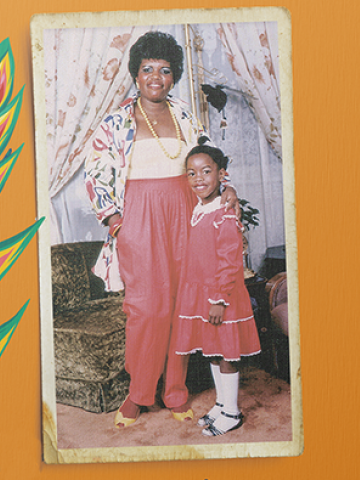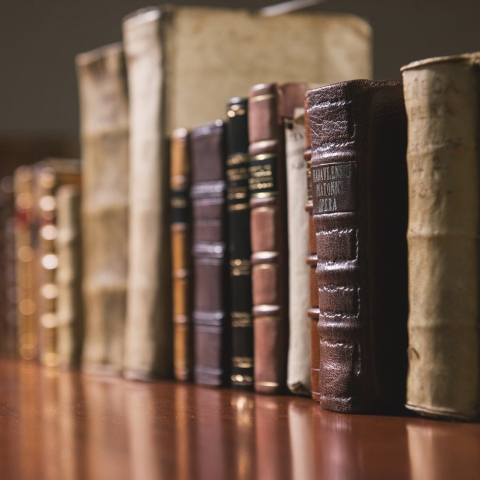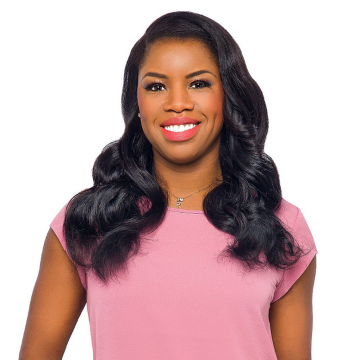Article |
My Mother's Daughter: A Memoir of Struggle and Triumph:
Writer’s Studio Alumnae Perdita Felicien Discusses Her Forthcoming Book

In this conversation between Perdita Felicien and Sarah Ashley, both alumni and former classmates of the University of Chicago Writer’s Studio Certificate Program in Creative Nonfiction Writing, the two writers discuss Felicien’s forthcoming memoir, vulnerability in nonfiction, and why research makes for great storytelling.
My first impression of Perdita Felicien can be boiled down to a single vibe: determination. I met her in a Creative Nonfiction course at the Writer’s Studio in January 2015. In my mind, I see her wearing a fuschia shirt on that first day. During introductions, Perdita’s voice exuded confidence, charisma, and intelligence. She was a retired professional athlete and a broadcast journalist, she told us. She was also here for a reason. She was going to write a book.
Over the next eight weeks, as our class discussed Lee Gutkind’s You Can’t Make This Up and workshopped each other’s essays, Perdita shared several excerpts from her memoir-in-progress that stick with me to this day. I marveled at her ability to recreate dialogue, express emotion, and build tension. It was no surprise to me when she announced in 2019 that Penguin Random House Canada would publish her completed book, My Mother’s Daughter: A Memoir of Struggle and Triumph. It hits bookshelves March 2021.
Sarah Ashley: I’ve known about this project since 2015, but it seems like something that had been percolating far before our classes. How long have you wanted to write this book?
Perdita Felicien: I’d say since 2005. When I was a pro athlete, I always knew one day I would write my story. But, it wasn’t until 2012 when I was about to retire from racing that I set out to do it. Even then, it took me another two years to find the courage to put the first words on the page.
SA: Writing a memoir is a huge undertaking. Who or what steered your path along the way?
PF: For sure it was my family and the love I have for my mother. In fact before I began writing I called a meeting with all my loved ones becauseI wanted their permission to move forward with the book. I knew that if I didn’t get their blessing I wasn’t going to write it. I’m grateful that I did receive their support that day and that they trusted me to tell this deeply personal story of us.
SA: What do you enjoy about creative nonfiction and memoir?
PF: I have always been drawn to creative nonfiction. There is something enchanting about knowing that what I am reading really took place. That fact carries a lot of weight for me. When I think of the genre of memoir it offers every person a voice, and gives them a place to tell their story. What could be more powerful than that?
SA: Much of the book revolves around your mother and her life before you were born. How do you approach writing memories - both your own and others’?
PF: I read extensively about memory and remembering as I was writing, which helped me immensely. I learned how fact and emotion can change over time and that our pasts can be affected by our present. Knowing this informed how I approached recreating scenes and revisiting the past.
When it came down to it, I did a lot of research to establish as much fact as I could by using old newspapers, letters, diaries, pictures, my memory, and the memories of others.There were details no one could remember or establish conclusively and I made a point to not fill in those blanks. My hope was that the reader would understand or fill them in for themselves. It was more important to me to be trusted as a storyteller.
SA: Even in the early sections of the book you workshopped in class, I remember being impressed by the dialogue you wrote between your mother and her employers. It clipped along and drew me in, yet you weren’t present for these conversations. How do you approach writing dialogue in creative nonfiction?
PF: I remember all those workshops with you and our classmates, honestly those were some of my favourite parts of being a part of the University of Chicago Writer’s Studio. Admittedly, as a first time author this was intimidating for me, but being in our program helped me with this a lot. I found as a memoirist that I wanted to recreate scenes and dialogue because that would place the reader the closest to my experiences.
Like you say I detail events that happened before I was born, and sure, people might wonder how I could possibly know what was said. Cause no one walks around with a tape recorder attached to their hip their entire life. So I used research, interviews, instinct, and the fact that I knew many of these people or people who knew them well. When I did recreate conversations and inner dialogue, the rendering was always authentic and my intention as a writer was only to bring about a clear representation of a particular memory.
Admittedly, as a first time author this was intimidating for me, but being in our program helped me with this a lot. I found as a memoirist that I wanted to recreate scenes and dialogue because that would place the reader the closest to my experiences.
SA: What kind of research did you do, and how long did you spend researching before beginning this book?
PF: A ton! I felt like a historian at times and surprisingly to me it was one of the most satisfying aspects of writing this book. I travelled to St. Lucia where my mother was born twice to interview people and access their main library. I tracked down and talked to as many people as I could from our past and spent hours in and out of libraries. This story is very much my mother’s and I relied on her recollections a lot. I could not have written this story without her and to use my husband’s terminology, I interrogated her like I was a member of the FBI. Yikes! Sorry, Mom.
SA: Who are the authors you look to for inspiration?
PF: This question is tough for me because I read a lot of personal essays and memoirs and I don’t care who wrote them. Meaning I don’t check to see if they are an established author or if there is buzz around their writing. I’ve read many creative nonfiction titles by popular authors like Joan Didion and yet to be published writers like some of our classmates at the Writer’s Studio. In fact I remember in class critiquing the piece you wrote on living with synesthesia and how vivid and fascinating it was for us to learn about it. I find that every time I finish a new book or essay it leaves me feeling inspired and more determined to find my own words to write.
SA: While writing a book about your mother, you became a mother yourself. What do you hope your daughter gains from this book?
PF: I started writing years before Nova was even a thought and I finished my manuscript when she was less than six months old. So before she came into the world I knew where I was going with this story. Now that she is here, and nearly a year old, my hope is that she will be proud of me, and the strong lineage of women she comes from.
The way I see it, my own daughter now has an account of some of the sacrifices and triumphs experienced by her grandmother, great–grandmother, and aunts. She will see that her own life is richer because of them and my wish is that she will move through life with a strong sense of self and gratitude.
SA: How important is vulnerability to writing? Did you ever hit roadblocks when it came to being vulnerable?
PF: You know, it’s not like anyone asks you to skin yourself as a writer for their entertainment, but it sure felt like it at times. But in all seriousness,I learned early on that being vulnerable was key to telling a compelling story. For me there was no point starting if I wasn’t going to reveal the full truth of my experiences - even the messy and painful ones.
As you know, I tackle some heavy themes in my book, like domestic abuse, homelessness, illegal immigration, and heartache. I was not going to write a memoir only to edit my life for the sake of ego. Readers are intelligent and they can see through the pretence.
SA: What advice would you give to an aspiring memoirist (asking for a friend…)?
PF: Sarah I hope you are that friend! The world is so ready to read all your stories. I’d tell an aspiring writer, or anyone who endeavours to achieve something, to start even if you don’t have all the pieces to the puzzle. Because I had no idea how to write a book, I spent my early days reading about how to actually write one. Looking back, that became a bit of a crutch because I wanted all the answers beforehand, which stalled me. So I say jump in and figure it out as you go. Forget having it all perfectly mapped out.
SA: How did the University of Chicago Writer’s Studio impact your writing career?
PF: It really set me on my way as a writer when I began the two-year certificate program back in January 2015. You know just as well as I do how much that atmosphere really challenged and encouraged us as emerging writers. I was able to mine some of the earliest chapters of my book, many scenes that appear in my finished memoir are the ones that you, fellow students, and our instructor Kevin Davis helped me shape.
Another one of my teachers was Dina Elenbogen who also introduced me to a host of trusted authors, poems, essays, and books. The certificate program was world-class and I hope to see it come back one day soon.

Learn more about Open Enrollment
Learn about writing, literature, and other noncredit courses downtown and online at the University of Chicago Graham School.
Learn more




